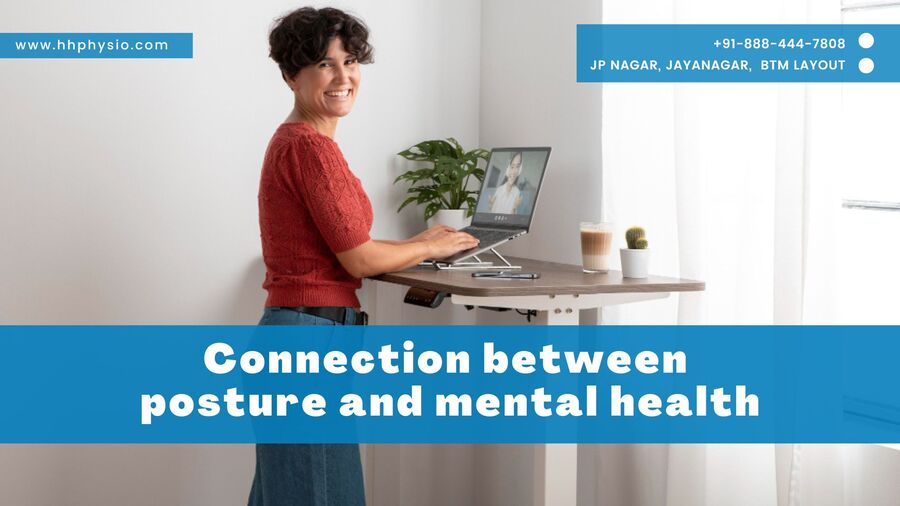Connection between posture and mental health
In our quest for optimal mental health, we often focus on the more obvious factors like exercise, nutrition, and stress management. However, there’s one crucial element that we tend to overlook: our posture. While good posture has long been associated with physical well-being, recent research reveals a fascinating connection between our posture and mental health. So, whether you’re slouching over your desk or hunched over your phone, it’s time to straighten up and explore the powerful impact that posture can have on your state of mind.
The Mind-Body Connection:
It’s no secret that our minds and bodies are intricately connected. Our mental and emotional state often manifests in our physical posture, and conversely, our physical posture can influence our mental state. Think about it: when you’re feeling confident and happy, you naturally stand tall with your shoulders back and your head held high. On the other hand, when you’re feeling down or anxious, you might find yourself slumping or hunching over. This interplay between body and mind provides a clue to the profound connection between posture and mental health.
Boosting Confidence and Mood:
Maintaining good posture has been shown to enhance confidence and mood. Research suggests that adopting an upright posture can lead to increased self-esteem, improved feelings of power, and reduced levels of stress and anxiety. When you sit or stand with proper alignment, your body sends signals to your brain that you are strong and capable. These signals can trigger a positive feedback loop, boosting your confidence and overall sense of well-being. So, the next time you need a quick mood lift, try straightening your posture and notice the immediate shift in your mindset.
Relieving Stress and Anxiety:
Stress and anxiety have become all too common in today’s fast-paced world. However, correcting your posture can be a simple yet effective way to combat these negative emotions. When you slouch or slump, you restrict your breathing and compress vital organs, leading to decreased oxygen intake and increased tension. In contrast, practicing good posture opens up your chest, allowing for deep, diaphragmatic breathing. This type of breathing triggers the body’s relaxation response, reducing stress hormones and promoting a sense of calm. By consciously improving your posture, you can help alleviate the physical and mental burden of stress and anxiety.
Improving Focus and Productivity:
Have you ever noticed that it’s easier to concentrate and be productive when you’re sitting or standing up straight? Well, there’s a scientific reason for it. Proper posture helps align your spine, which ensures optimal blood flow to your brain. This improved circulation enhances cognitive function, including memory, attention, and problem-solving skills. Additionally, maintaining an alert posture keeps you more engaged and present in the moment, preventing distractions from hijacking your focus. So, if you find your mind wandering during work or study sessions, paying attention to your posture might be the key to unlocking your productivity potential.
Practical Tips for Better Posture:
Now that we understand the connection between posture and mental health, it’s time to put this knowledge into practice. Here are some practical tips to help you improve your posture and reap the mental health benefits:
1. Be mindful: Pay attention to your posture throughout the day. Regularly check in with yourself and make necessary adjustments to maintain proper alignment.
2. Sit and stand tall: Imagine a string pulling you up from the crown of your head. Engage your core muscles, roll your shoulders back, and relax your neck and jaw. Find ergonomic solutions for your workspace to support good posture.
3. Stretch and strengthen: Incorporate exercises that promote a strong core, flexible spine, and open chest into your fitness routine. Yoga, Pilates and strength training are great options to improve posture.
4. Take regular breaks: If you have a sedentary lifestyle, make sure to take breaks from sitting or standing in the same position for prolonged periods. Use these breaks to stretch, walk around, and reset your posture.
5. Use technology wisely: With the prevalence of smartphones and laptops, it’s easy to develop poor posture habits while using these devices. Be conscious of your body position when using technology and take frequent breaks to avoid slouching.
6. Get ergonomic support: Invest in ergonomic chairs, supportive pillows, and standing desks to provide proper support to your spine and promote good posture.
7. Practice mindfulness and relaxation techniques: Incorporate mindfulness exercises and relaxation techniques into your daily routine. Activities like meditation, deep breathing exercises, and yoga can help reduce tension, promote body awareness, and support good posture.
Conclusion:
Your posture is more than just a physical aspect of your well-being. It plays a significant role in your mental health as well. Posture and mental health are related to each other. By maintaining good posture, you can boost your confidence, alleviate stress and anxiety, improve focus and productivity, and ultimately enhance your overall mood and well-being. So, make a conscious effort to straighten up, align your body, and experience the positive impact that good posture can have on your mental health. Remember, a confident and uplifted posture can lead to a confident and uplifted mind!
Also Read: How to maintain a good posture while doing a desk job
Share it with others…

